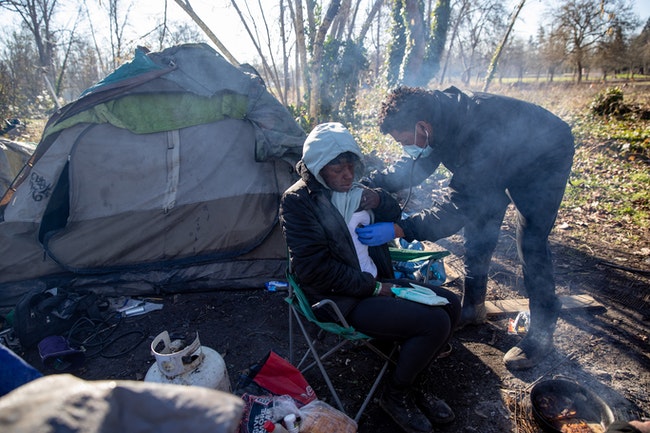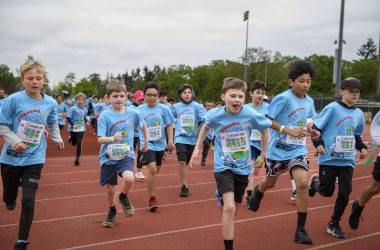 Justin Davis, outreach nurse, listens to Rita Edward’s heart after she complained of chest pain at her camp in Wallace Marine Park on Friday, Jan. 28, 2022. (Amanda Loman/Salem Reporter)
Justin Davis, outreach nurse, listens to Rita Edward’s heart after she complained of chest pain at her camp in Wallace Marine Park on Friday, Jan. 28, 2022. (Amanda Loman/Salem Reporter)
For four days, Scott Botel yelled for help.
He laid in a tent at Cascades Gateway Park in Salem, where temperatures had reached 115 due to the summer 2021 heat wave. He couldn’t get up, suffering from heart failure and his knees had given out.
Eventually, Peter Buekea found him. Botel recognized Buekea – he and a nurse had recently come by the park, where the city of Salem allowed homeless people to stay for 17 months during the pandemic, asking if anyone needed medical attention, hygiene kits, snacks, water or anything else.
Buekea, a case manager for the Homeless Outreach and Advocacy Project, helped Botel get access to medication for his heart. It was one of multiple times Buekea saved Botel’s life.
“A lot of people when they first start coming around thought they were feds or cops. It’s like, “No, no. Knock it off, that’s my doctor,” said Botel. “But they’re very good people.”
 Peter Buekea, outreach case manager, talks with Scott Botel as Botel sorts his belongings in anticipation of moving into an apartment, in Wallace Marine Park on Friday, Jan. 28, 2022. (Amanda Loman/Salem Reporter)
Peter Buekea, outreach case manager, talks with Scott Botel as Botel sorts his belongings in anticipation of moving into an apartment, in Wallace Marine Park on Friday, Jan. 28, 2022. (Amanda Loman/Salem Reporter)
For the past two years, Buekea has walked trails with a nurse to tent encampments and checked if anyone needed help as part of Northwest Human Services’ Street Outreach Team.
Outreach workers also drive a bus three times a week through Salem and Keizer, giving homeless people bus rides to appointments at Northwest Human Services’ west Salem clinic. In addition to meals, showers and laundry services available at HOAP in northeast Salem, the clinic in west Salem provides medical, dental and mental health care for patients who are often low-income, homeless, uninsured or under-insured.
The street outreach team is intended to reach people who are eligible for those services but don’t visit HOAP or the clinic themselves, often because they live on another side of town, are deep in the woods or are mobility-impaired.
“It’s really hard for a lot of people to pack up their entire home just to come in for a medical appointment,” said Scott Prentice, program manager for HOAP and Northwest Human Services’ crisis and information hotline.
The street outreach team consists of a case manager and a registered nurse. Several days a week, they walk trails where they know people are camping, from prior contacts with them or calls from community partners, law enforcement and the public asking if they can check on people. They also have a care coordinator at the clinic who lets them know when patients are discharged.
The team typically does outreach five days a week, but that has been more challenging in recent weeks due to a staffing shortage.
“Everyone’s got one,” Prentice said of outreach teams, but what sets theirs apart is being able to provide basic medical services in the field. “Others just don’t have that capacity,” he said.
The purpose of pairing a registered nurse with a case manager is to provide both medical care and social services. Buekea often helps people get access to birth certificates so they can get identification cards. That allows them to get food stamps, social security, create an email, and mail services. “All of these things that I think a lot of us kind of take for granted, not quite realizing that you can’t do a lot of things without internet access or cell phone service.”
It can sometimes be difficult for outreach workers to find the people they’re trying to help, especially when homeless camps are swept.
“We do want to know where you’re going if you have a plan so that they can connect back with them,” said Kellee Borsberry, a registered nurse and the clinical services manager for Northwest Human Services. “A lot of people don’t have a plan, because there isn’t a spot for them really to go.”
In 2021, Buekea and Holloway made more than 1,200 contacts with homeless people, visited more than 500 tents and vehicles where people were living and distributed more than 12,000 food, wellness or health kits. Holloway provided medical care for more than 100 people in the field, and the team transported around 90 people from the street to medical support services for immediate needs.
Three days a week, the street outreach team takes a Northwest Human Services bus to local homeless shelters to pick people up and drop them off at the clinic for reserved appointments, often referred by shelter employees. Outreach workers stop at Simonka Place, UGM and, if requested to staff, the Salvation Army, HOST and ARCHES to pick people up.
They don’t always need appointments, though. When Buekea and a registered nurse, Justin Davis, stopped by one shelter on Jan. 28, they noticed a man standing outside the building with crutches and a cast on his foot. Davis learned the man was suffering from frostbite, and they took him to the clinic for treatment.
 Justin Davis, an outreach nurse with Northwest Human Services, talks with passenger David West as the bus heads to the West Salem Clinic on Friday, Jan. 28, 2022. (Amanda Loman/Salem Reporter)
Justin Davis, an outreach nurse with Northwest Human Services, talks with passenger David West as the bus heads to the West Salem Clinic on Friday, Jan. 28, 2022. (Amanda Loman/Salem Reporter)
Primary care physicians and mental health professionals from the clinic also go to HOAP at 694 Church St NE every Wednesday and provide treatment for the first half of the day.
Kevin Holloway, a registered nurse and street outreach nurse for Northwest Human Services, said going to where people stay, like a camp or vehicle, and asking if they have medical needs is often more successful in getting people access to treatment.
“The consistency is really important. Because if we’re there on a certain day of the week every week, the neighbors will start to be like, ‘Hey, you need to go talk to those guys. Those are the medical guys,’” Holloway said. “The camps start to know us and refer people to us and put in a good word for us.”
Many patients who come straight to the clinic immediately run into barriers, such as not having an appointment, knowing the right person to talk to and filling out paperwork.
Holloway said the clinic treats people all the time who would never otherwise go to a doctor’s office. “They are getting life-saving treatments in the clinic that they would not have gotten otherwise, or they would have ended up in the ER,” he said. “Or women living on the street, pregnant women, we’re getting them prenatal care, getting them into temporary shelter off the street.”
Some patients also have trauma from bad experiences with hospitals or medical clinics, and it can take time for the team to build trust.
“We’re never there forcing them into care, “Buekea said. “But we’ll continue to provide options and information about what we do. And the more we do that, the more they see our face, the more they see us out in the community, they’re like, ‘Maybe today’s the day that we go to HOAP or the clinic. Can we get that service?’ And sure enough, they come here.”
 Outreach nurse Justin Davis examines an injury on Mike Bauman’s hand near his trailer in the parking lot of the Mega Foods on Friday, Jan. 28, 2022. (Amanda Loman/Salem Reporter)
Outreach nurse Justin Davis examines an injury on Mike Bauman’s hand near his trailer in the parking lot of the Mega Foods on Friday, Jan. 28, 2022. (Amanda Loman/Salem Reporter)
It also takes patience. The team has waited for hours at Salem hospital before doctors are able to talk with a patient, and advocated for specific needs or concerns the doctor should ask them about.
“In all honesty, if they show up at the emergency room on their own … they’ll be either dismissed or they feel judged,” said Borsberry. “I’m not blaming the hospital because I’m not on that side. I think it would be hard.”
Buekea said it took several visits before convincing a woman who was seven and a half months pregnant to come into the clinic. She was staying at a camp near Commercial Street, and had to hike through the woods to get to it. He said it was unlikely an ambulance would be able to find her.
“I genuinely have nightmares about going out there while she was giving birth,” said Holloway.
Borsberry said the woman was insistent on having the child at her camp. “I would just go out there, woman-to-woman, let’s talk about this. And I’m a mom and I get it, but what can I do to help you,” she said.
They were able to set up appointments for her, paid her phone bill after her data ran out, helped her get an ID card and put her up in a hotel room, where she went into labor shortly after. Her boyfriend called Borsberry, in a panic. “I will be right there,” she told them.
“We jumped in the car and ran over there and I called 911… It was intense.”
The baby was delivered at the hospital, but tested positive for methamphetamine. They found a family member who would take in the baby and helped get the woman connected with a treatment program. She later got clean.
“I think we’re all like-minded people. This is not for everybody,” Borsberry said. “I honestly think it’s innately in you, that you have that much empathy and compassion for somebody and can look past whatever they’re dealing with right now, just to just make their day a little bit better. So it’s very rewarding work, it can be very frustrating work.”
Buekea said one of the most difficult parts of his job is knowing the “stark reality of the lack of available resources for people who want to get off the street,” with waiting lists for local shelters 100- to 300-deep.
“It hurts, It’s a horrible feeling,” he said. “‘Where do I go, Pete?’ I don’t know where to go, there’s no proof spot. You might be able to go over there, but you also might get a knock on your window at three o’clock in the morning from a police officer.”
 Peter Buekea, outreach case manager, makes a phone call to try and arrange for towing for Mike Bauman’s trailer to try and have it moved before the deadline set by the city on Friday, Jan. 28, 2022. (Amanda Loman/Salem Reporter)
Peter Buekea, outreach case manager, makes a phone call to try and arrange for towing for Mike Bauman’s trailer to try and have it moved before the deadline set by the city on Friday, Jan. 28, 2022. (Amanda Loman/Salem Reporter)
Holloway said he treats some patients who he knows are too sick to live on the street. “The hardest part is when you put in all this energy, spent all this time, take them to a doctor, get them (to HOAP), they get a shower and they eat. And then we take them back and say, ‘Here’s the street. Sorry, we don’t have anywhere for you to go,’” he said.
He said he wishes the street outreach team could help more people than they do, but they already get many referrals from their community partners for people they’ve had contact with before and have been trying to follow up with. “We don’t get to do that as much as we’d like,” he said.
Prentice said Marion County is lacking key services it needs for people living on the streets to survive.
“There’s no medical respite center, there’s no sobering center. There’s no place we know of where you can get the mental health treatment when you have substance abuse disorder as well,” Prentice said. “There needs to be more affordable housing, there’s just not places for these people to go. So they’re just kind of in limbo outside until their number gets called or they get sick enough and have to go inpatient at the hospital. So these guys are just kind of keeping people going until that happens.”
Still, he said, “they’ve intervened in quite a few people’s lives where if they hadn’t, we don’t think they’d be around today.”
Contact reporter Ardeshir Tabrizian: [email protected] or 503-929-3053.
JUST THE FACTS, FOR SALEM – We report on your community with care and depth, fairness and accuracy. Get local news that matters to you. Subscribe to Salem Reporter starting at $5 a month. Click I want to subscribe!









